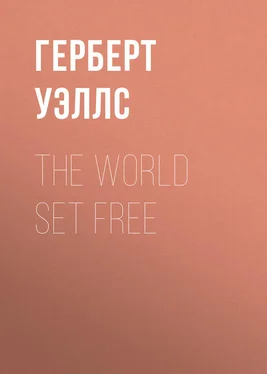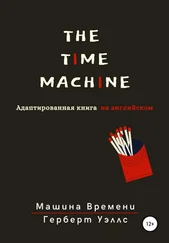Герберт Уэллс - The World Set Free
Здесь есть возможность читать онлайн «Герберт Уэллс - The World Set Free» — ознакомительный отрывок электронной книги совершенно бесплатно, а после прочтения отрывка купить полную версию. В некоторых случаях можно слушать аудио, скачать через торрент в формате fb2 и присутствует краткое содержание. Жанр: foreign_antique, foreign_prose, на английском языке. Описание произведения, (предисловие) а так же отзывы посетителей доступны на портале библиотеки ЛибКат.
- Название:The World Set Free
- Автор:
- Жанр:
- Год:неизвестен
- ISBN:нет данных
- Рейтинг книги:5 / 5. Голосов: 1
-
Избранное:Добавить в избранное
- Отзывы:
-
Ваша оценка:
- 100
- 1
- 2
- 3
- 4
- 5
The World Set Free: краткое содержание, описание и аннотация
Предлагаем к чтению аннотацию, описание, краткое содержание или предисловие (зависит от того, что написал сам автор книги «The World Set Free»). Если вы не нашли необходимую информацию о книге — напишите в комментариях, мы постараемся отыскать её.
The World Set Free — читать онлайн ознакомительный отрывок
Ниже представлен текст книги, разбитый по страницам. Система сохранения места последней прочитанной страницы, позволяет с удобством читать онлайн бесплатно книгу «The World Set Free», без необходимости каждый раз заново искать на чём Вы остановились. Поставьте закладку, и сможете в любой момент перейти на страницу, на которой закончили чтение.
Интервал:
Закладка:
In the evening Holsten went out again. He walked to Saint Paul’s Cathedral, and stood for a time near the door listening to the evening service. The candles upon the altar reminded him in some odd way of the fireflies at Fiesole. Then he walked back through the evening lights to Westminster. He was oppressed, he was indeed scared, by his sense of the immense consequences of his discovery. He had a vague idea that night that he ought not to publish his results, that they were premature, that some secret association of wise men should take care of his work and hand it on from generation to generation until the world was riper for its practical application. He felt that nobody in all the thousands of people he passed had really awakened to the fact of change, they trusted the world for what it was, not to alter too rapidly, to respect their trusts, their assurances, their habits, their little accustomed traffics and hard-won positions.
He went into those little gardens beneath the over-hanging, brightly-lit masses of the Savoy Hotel and the Hotel Cecil. He sat down on a seat and became aware of the talk of the two people next to him. It was the talk of a young couple evidently on the eve of marriage. The man was congratulating himself on having regular employment at last; ‘they like me,’ he said, ‘and I like the job. If I work up – in’r dozen years or so I ought to be gettin’ somethin’ pretty comfortable. That’s the plain sense of it, Hetty. There ain’t no reason whatsoever why we shouldn’t get along very decently – very decently indeed.’
The desire for little successes amidst conditions securely fixed! So it struck upon Holsten’s mind. He added in his diary, ‘I had a sense of all this globe as that…’
By that phrase he meant a kind of clairvoyant vision of this populated world as a whole, of all its cities and towns and villages, its high roads and the inns beside them, its gardens and farms and upland pastures, its boatmen and sailors, its ships coming along the great circles of the ocean, its time-tables and appointments and payments and dues as it were one unified and progressive spectacle. Sometimes such visions came to him; his mind, accustomed to great generalisations and yet acutely sensitive to detail, saw things far more comprehensively than the minds of most of his contemporaries. Usually the teeming sphere moved on to its predestined ends and circled with a stately swiftness on its path about the sun. Usually it was all a living progress that altered under his regard. But now fatigue a little deadened him to that incessancy of life, it seemed now just an eternal circling. He lapsed to the commoner persuasion of the great fixities and recurrencies of the human routine. The remoter past of wandering savagery, the inevitable changes of to-morrow were veiled, and he saw only day and night, seed-time and harvest, loving and begetting, births and deaths, walks in the summer sunlight and tales by the winter fireside, the ancient sequence of hope and acts and age perennially renewed, eddying on for ever and ever, save that now the impious hand of research was raised to overthrow this drowsy, gently humming, habitual, sunlit spinning-top of man’s existence…
For a time he forgot wars and crimes and hates and persecutions, famine and pestilence, the cruelties of beasts, weariness and the bitter wind, failure and insufficiency and retrocession. He saw all mankind in terms of the humble Sunday couple upon the seat beside him, who schemed their inglorious outlook and improbable contentments. ‘I had a sense of all this globe as that.’
His intelligence struggled against this mood and struggled for a time in vain. He reassured himself against the invasion of this disconcerting idea that he was something strange and inhuman, a loose wanderer from the flock returning with evil gifts from his sustained unnatural excursions amidst the darknesses and phosphorescences beneath the fair surfaces of life. Man had not been always thus; the instincts and desires of the little home, the little plot, was not all his nature; also he was an adventurer, an experimenter, an unresting curiosity, an insatiable desire. For a few thousand generations indeed he had tilled the earth and followed the seasons, saying his prayers, grinding his corn and trampling the October winepress, yet not for so long but that he was still full of restless stirrings.
‘If there have been home and routine and the field,’ thought Holsten, ‘there have also been wonder and the sea.’
He turned his head and looked up over the back of the seat at the great hotels above him, full of softly shaded lights and the glow and colour and stir of feasting. Might his gift to mankind mean simply more of that?.
He got up and walked out of the garden, surveyed a passing tram-car, laden with warm light, against the deep blues of evening, dripping and trailing long skirts of shining reflection; he crossed the Embankment and stood for a time watching the dark river and turning ever and again to the lit buildings and bridges. His mind began to scheme conceivable replacements of all those clustering arrangements…
‘It has begun,’ he writes in the diary in which these things are recorded. ‘It is not for me to reach out to consequences I cannot foresee. I am a part, not a whole; I am a little instrument in the armoury of Change. If I were to burn all these papers, before a score of years had passed, some other man would be doing this..
Holsten, before he died, was destined to see atomic energy dominating every other source of power, but for some years yet a vast network of difficulties in detail and application kept the new discovery from any effective invasion of ordinary life. The path from the laboratory to the workshop is sometimes a tortuous one; electro-magnetic radiations were known and demonstrated for twenty years before Marconi made them practically available, and in the same way it was twenty years before induced radio-activity could be brought to practical utilisation. The thing, of course, was discussed very much, more perhaps at the time of its discovery than during the interval of technical adaptation, but with very little realisation of the huge economic revolution that impended. What chiefly impressed the journalists of 1933 was the production of gold from bismuth and the realisation albeit upon unprofitable lines of the alchemist’s dreams; there was a considerable amount of discussion and expectation in that more intelligent section of the educated publics of the various civilised countries which followed scientific development; but for the most part the world went about its business – as the inhabitants of those Swiss villages which live under the perpetual threat of overhanging rocks and mountains go about their business – just as though the possible was impossible, as though the inevitable was postponed for ever because it was delayed.
It was in 1953 that the first Holsten-Roberts engine brought induced radio-activity into the sphere of industrial production, and its first general use was to replace the steam-engine in electrical generating stations. Hard upon the appearance of this came the Dass-Tata engine – the invention of two among the brilliant galaxy of Bengali inventors the modernisation of Indian thought was producing at this time – which was used chiefly for automobiles, aeroplanes, waterplanes, and such-like, mobile purposes. The American Kemp engine, differing widely in principle but equally practicable, and the Krupp-Erlanger came hard upon the heels of this, and by the autumn of 1954 a gigantic replacement of industrial methods and machinery was in progress all about the habitable globe. Small wonder was this when the cost, even of these earliest and clumsiest of atomic engines, is compared with that of the power they superseded. Allowing for lubrication the Dass-Tata engine, once it was started cost a penny to run thirty-seven miles, and added only nine and quarter pounds to the weight of the carriage it drove. It made the heavy alcohol-driven automobile of the time ridiculous in appearance as well as preposterously costly. For many years the price of coal and every form of liquid fuel had been clambering to levels that made even the revival of the draft horse seem a practicable possibility, and now with the abrupt relaxation of this stringency, the change in appearance of the traffic upon the world’s roads was instantaneous. In three years the frightful armoured monsters that had hooted and smoked and thundered about the world for four awful decades were swept away to the dealers in old metal, and the highways thronged with light and clean and shimmering shapes of silvered steel. At the same time a new impetus was given to aviation by the relatively enormous power for weight of the atomic engine, it was at last possible to add Redmayne’s ingenious helicopter ascent and descent engine to the vertical propeller that had hitherto been the sole driving force of the aeroplane without overweighting the machine, and men found themselves possessed of an instrument of flight that could hover or ascend or descend vertically and gently as well as rush wildly through the air. The last dread of flying vanished. As the journalists of the time phrased it, this was the epoch of the Leap into the Air. The new atomic aeroplane became indeed a mania; every one of means was frantic to possess a thing so controllable, so secure and so free from the dust and danger of the road, and in France alone in the year 1943 thirty thousand of these new aeroplanes were manufactured and licensed, and soared humming softly into the sky.
Читать дальшеИнтервал:
Закладка:
Похожие книги на «The World Set Free»
Представляем Вашему вниманию похожие книги на «The World Set Free» списком для выбора. Мы отобрали схожую по названию и смыслу литературу в надежде предоставить читателям больше вариантов отыскать новые, интересные, ещё непрочитанные произведения.
Обсуждение, отзывы о книге «The World Set Free» и просто собственные мнения читателей. Оставьте ваши комментарии, напишите, что Вы думаете о произведении, его смысле или главных героях. Укажите что конкретно понравилось, а что нет, и почему Вы так считаете.


![Герберт Уэллс - The War of the Worlds [С англо-русским словарем]](/books/26611/gerbert-uells-the-war-of-the-worlds-s-anglo-thumb.webp)









